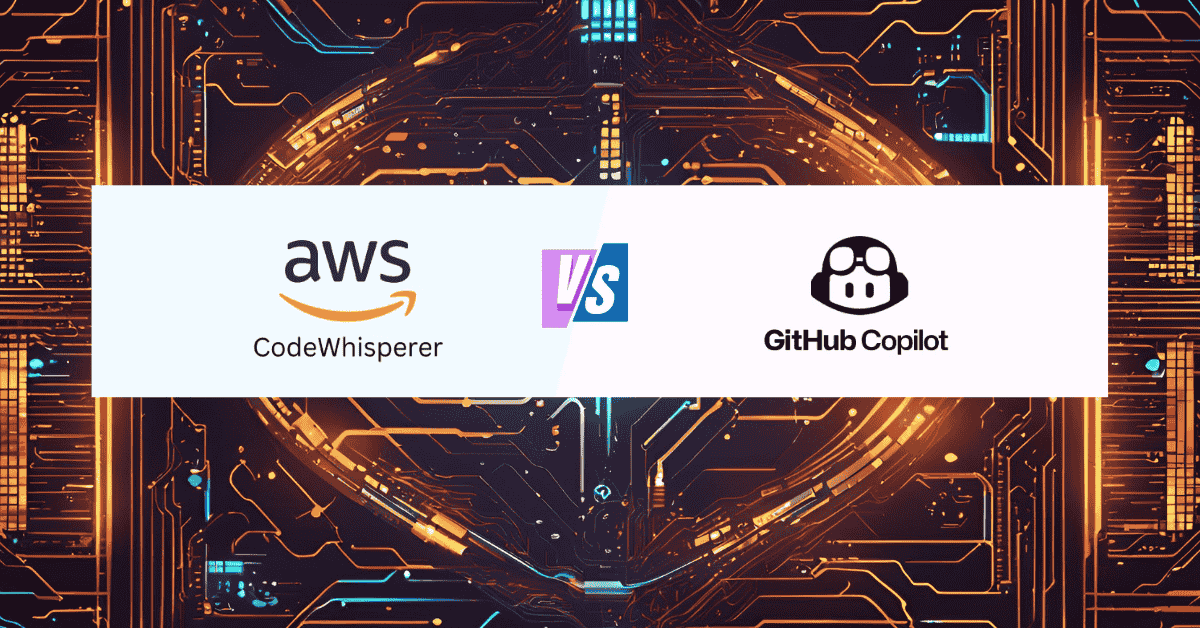CodeWhisperer vs Copilot: A Comparative Analysis of AI Coding Assistants

Choosing between CodeWhisperer and Copilot can be challenging for developers seeking coding assistance. Each tool offers unique features and strengths that can impact our workflow. After careful comparison, we find that CodeWhisperer shines in integration with AWS services, while Copilot is known for its seamless integration with Microsoft products.
As we explore the key differences between these two tools, we can better understand their specific use cases. Whether we prioritize cloud development with CodeWhisperer or are drawn to the versatility of Copilot, knowing what each one offers is crucial.
In this post, we will break down the core features, advantages, and potential drawbacks of both CodeWhisperer and Copilot. This way, we can make an informed choice that suits our coding needs.
Overview of CodeWhisperer
CodeWhisperer is a tool designed to assist programmers in writing code more efficiently. It offers various features that enhance coding productivity and streamline the development process.
Purpose and Functionality
CodeWhisperer aims to provide real-time code suggestions based on what developers are working on. It analyzes the context of the code to offer helpful snippets and complete functions. This functionality can save time and reduce the chances of errors.
Some notable features include:
- Context-aware suggestions: Adjusts recommendations based on existing code.
- Language support: Works with multiple programming languages.
- Integration capabilities: Can be integrated with popular development environments.
These attributes make CodeWhisperer a powerful assistant for developers looking to enhance their workflow and coding accuracy.
Launch and Development History
CodeWhisperer was officially launched in 2022, marking a significant step forward in AI-driven coding tools. Its development originated from the need for resources that aid developers in real-time scenarios.
The tool has seen improvements since its initial launch, with updates focusing on enhancing its algorithm and expanding functionality. Feedback from users has played a key role in shaping these advancements. As a result, CodeWhisperer has steadily gained popularity among programmers for its practical applications and user-friendly design.
Exploring GitHub Copilot
GitHub Copilot is an AI-powered coding assistant. It helps developers write code faster and improve their productivity. In this section, we will discuss its core features and trace its origins and evolution.
Core Features
GitHub Copilot has several important features that enhance coding. It offers real-time code suggestions, making it easier for us to write complex functions. This feature learns from our coding style, becoming more effective over time.
Another key aspect is the ability to generate entire code blocks. It can create functions, classes, and even comments based on our input. This saves valuable time and reduces repetitive tasks.
Copilot also supports multiple programming languages, such as Python, JavaScript, and TypeScript. This versatility allows us to use it across various projects seamlessly.
Origins and Evolution
GitHub Copilot was launched in June 2021. It is a product of collaboration between GitHub and OpenAI. This partnership combines GitHub’s extensive coding database with OpenAI’s advanced language model.
Initially, Copilot focused on helping with simple code snippets. As we provided feedback, it improved and learned more complex coding situations.
Over time, it has evolved to incorporate features like context-aware suggestions. These updates allow us to receive better-recommended code based on the current project.
The continuous updates have transformed Copilot into a versatile tool for many developers, from beginners to experts.
Technical Comparison
Code generation technologies
Both CodeWhisperer and Copilot utilize advanced AI models for generating code suggestions, but they differ in their underlying technology. CodeWhisperer is powered by Amazon’s proprietary machine learning algorithms, fine-tuned for AWS development environments. It excels in recognizing cloud-based coding patterns and optimizing them for AWS services.
On the other hand, GitHub Copilot leverages OpenAI’s Codex, a robust language model trained on a vast dataset of public code repositories. This allows it to provide highly accurate and versatile code suggestions, making it a great fit for various programming languages and frameworks.
Language Support
Language support plays a crucial role in selecting a coding assistant. CodeWhisperer supports languages commonly used in AWS development, including Python, Java, and JavaScript. Its specialized focus makes it an excellent choice for developers working within the AWS ecosystem.
Copilot, however, offers a broader range of language support, covering Python, JavaScript, TypeScript, Ruby, Go, and many more. This wider compatibility makes it a more flexible option for developers working across different environments.
IDE Integration
When it comes to IDE integration, both tools support major development environments. CodeWhisperer seamlessly integrates with AWS Cloud9, JetBrains IDEs, and Visual Studio Code. This makes it a strong contender for developers working within AWS-based workflows.
Copilot is designed to work effortlessly with Visual Studio Code, JetBrains IDEs, and Neovim. Given GitHub’s deep integration with Microsoft products, Copilot also aligns well with teams using Microsoft-based workflows.
User Experience
Ease of Use
CodeWhisperer is designed with simplicity in mind, making it easy for AWS developers to set up and use. It provides relevant suggestions based on real-time analysis, reducing the need for excessive configuration.
Copilot also offers an intuitive experience. With minimal setup, developers can start receiving suggestions instantly. Its seamless integration with VS Code makes it particularly accessible for those already using GitHub’s ecosystem.
Customization Options
CodeWhisperer provides users with options to refine suggestions based on coding patterns and project requirements. It also allows developers to enable or disable specific features to enhance usability.
Copilot, while not highly customizable in terms of settings, learns from user behavior over time. As we code, it adapts to our style and provides more relevant suggestions.
Documentation and Tutorials
CodeWhisperer provides comprehensive documentation and AWS-specific tutorials, ensuring users can maximize its benefits. It is particularly beneficial for those familiar with AWS’s documentation format.
Copilot offers extensive resources, including GitHub-hosted tutorials and community discussions. Developers can easily access support through GitHub’s ecosystem, making it easy to find solutions to common issues.
Performance Metrics
Accuracy of Suggestions
Both tools offer highly accurate suggestions, but their strengths differ. CodeWhisperer is exceptional at generating AWS-specific code, while Copilot excels in diverse programming tasks. Copilot’s AI model is trained on a wider dataset, giving it an edge in general-purpose coding.
Responsiveness
Copilot tends to generate suggestions slightly faster due to its advanced AI processing power. However, CodeWhisperer is highly responsive when working with AWS-related code, making it a solid choice for cloud developers.
Learning Curve
Copilot’s ease of use ensures a minimal learning curve. Developers can start using it almost immediately without requiring deep configuration. CodeWhisperer has a slightly steeper learning curve for those unfamiliar with AWS services, but its guided documentation helps ease the transition.
Integration in Development Workflows
Collaboration with Version Control
Both tools integrate well with version control systems. CodeWhisperer works smoothly with AWS CodeCommit, while Copilot aligns well with GitHub repositories. This means that developers can maintain efficient version control workflows while using these tools.
Considerations for Team Settings
For team collaboration, Copilot’s deep GitHub integration provides a seamless experience. Developers can use Copilot in team-based repositories without much configuration. CodeWhisperer is better suited for AWS teams who prioritize cloud-native development and security.
Privacy and Security
Data Handling
CodeWhisperer follows AWS’s strict security protocols, ensuring that code suggestions align with best practices in cloud security. It does not retain user code beyond active sessions.
Copilot, while secure, raises some concerns as it uses a model trained on public codebases. Developers should be cautious about proprietary code being suggested in Copilot.
Code Confidentiality
CodeWhisperer offers built-in features to enhance code confidentiality, including AWS’s security mechanisms. Copilot, on the other hand, relies on GitHub’s policies for code privacy, which may not be sufficient for developers handling sensitive data.
Community and Support
Community Engagement
Copilot benefits from GitHub’s vast developer community, where users can share feedback, report issues, and collaborate on improvements.
CodeWhisperer, while newer, has growing AWS developer support and forums that provide guidance on cloud-based development.
Developer Support Channels
AWS provides structured support for CodeWhisperer, including dedicated technical support and documentation. Copilot, being part of GitHub, has active community forums and official support channels where users can seek help.
Licensing and Pricing
Subscription Models
CodeWhisperer offers a free tier with limitations and a paid version for businesses. The paid plan provides additional security features and better integration with AWS services.
Copilot follows a subscription-based model, with individual and enterprise pricing options. GitHub offers discounted plans for students and open-source contributors.
Cost-Benefit Analysis
For developers heavily using AWS services, CodeWhisperer’s pricing is justified due to its deep cloud integration. Copilot, however, offers more value for those working across multiple programming languages and frameworks.
Future Outlook
Planned Features
AWS is expected to expand CodeWhisperer’s functionality, improving its AI capabilities and integration with more AWS services.
Copilot continues to refine its AI model, with planned updates to improve accuracy, reduce biases, and expand compatibility with additional IDEs.
Market Trends
AI-assisted coding is becoming a staple in modern development workflows. With continuous improvements, both CodeWhisperer and Copilot will remain competitive, catering to different segments of developers based on their needs.
Conclusion
Both CodeWhisperer and Copilot bring unique strengths to the table. If your development is centered around AWS, CodeWhisperer is a natural choice. However, if you prefer a broader tool with multi-language support and strong GitHub integration, Copilot is the way to go.
Ultimately, the best choice depends on your development environment, security considerations, and team collaboration needs.






